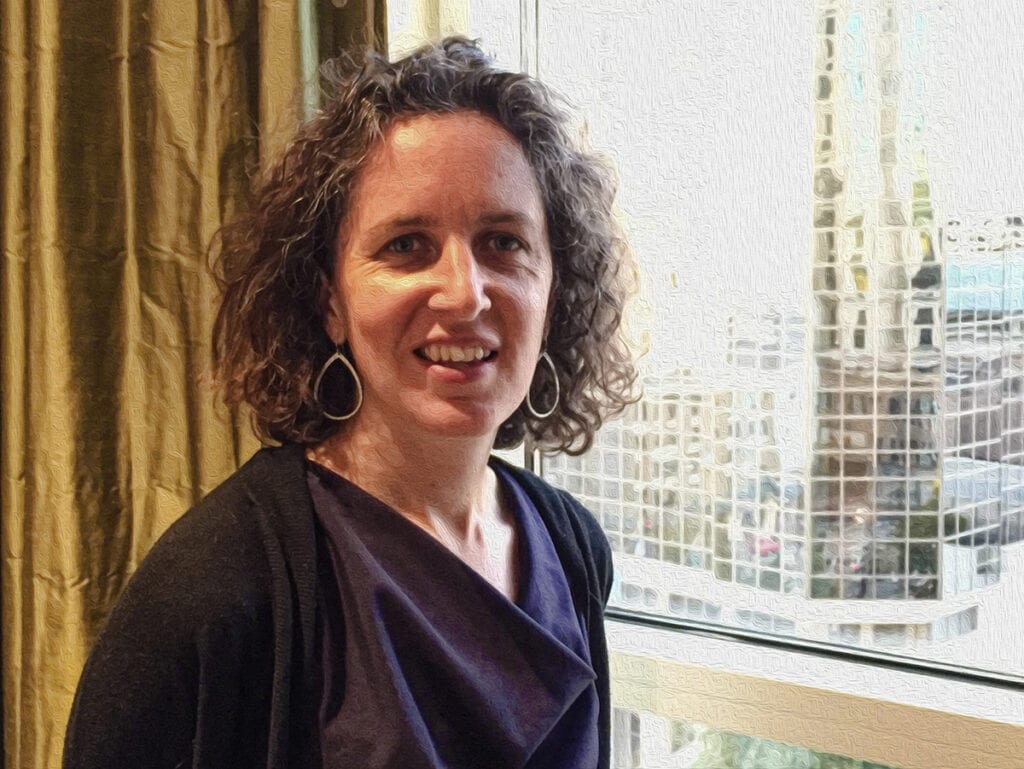 Foto cortesía de Pilar Weiss
Foto cortesía de Pilar WeissLa Midwest Immigration Bond Fund Coalition ha recaudado más de $35.000 para rescatar a inmigrantes detenidos de Illinois, Indiana, Wisconsin y Kentucky.
No te pierdas ni una noticia. Suscríbase a nuestro boletín de los jueves para conocer lo último sobre las comunidades de inmigrantes de Chicago.
Lester* no pensaba que nada pudiera ser peor que su estancia en prisión. El inmigrante guatemalteco había contraído COVID-19 poco antes de salir en libertad en septiembre y la prisión lo aisló en un hotel, donde se vio obligado a sufragar todos los gastos de su estancia.
Pero los tres meses que pasó en detención de inmigrantes intentando averiguar cómo pagar su fianza de $2.500 hicieron que casi echara de menos la cárcel.
"Se supone que es sólo una retención", dijo Lester sobre la detención en una cárcel del condado en Woodstock, Illinois, donde fue retenido por el Servicio de Inmigración y Control de Aduanas. "Pero nos daban de comer porciones pequeñas y no hacían bien la cuarentena. COVID se estaba extendiendo hasta que los chicos del condado se contagiaron, y estuvimos en nuestra habitación todo el día excepto una hora".
Lester fue liberado de la detención del ICE el 5 de abril gracias al apoyo de la nueva Coalición del Fondo de Bonos de Inmigración del Medio Oesteque pagó su fianza. La coalición gestiona un fondo rotatorio que se utiliza para liberar a personas como Lester de la custodia del ICE. Lester, que Borderless mantiene en el anonimato por motivos de seguridad, sigue en trámites de inmigración y se enfrenta a una posible deportación. Ahora podrá defender su caso desde fuera.
Mientras que Illinois ha aprobado recientemente una nueva ley que pondría fin a la detención de inmigrantes en la cárcel del condado de McHenry y en otras cárceles locales del estado en 2022, los inmigrantes siguen detenidos en cárceles locales aquí y en otros lugares del Medio Oeste. Durante la pandemia, estos centros de detención se han convertido en focos de infección.
La cárcel del condado de McHenry tuvo un promedio de 189 detenidos por día en el año fiscal 2020, según un informe del condado. En la cárcel se han registrado 14 casos de COVID-19 entre inmigrantes detenidos, el primero de ellos el pasado mes de julio, según ICE.
Lester dijo que, según su experiencia, en el correccional de adultos del condado de McHenry trataban a los inmigrantes "como si estuvieras en la cárcel, o peor".
"Sólo somos detenidos del ICE, así que los funcionarios del condado prácticamente no quieren saber nada de nosotros. Nunca quieren ayudarte", dice Lester.

Ilustración de Brian Herrera para Borderless Magazine/CatchLight Local
En respuesta a una solicitud de registros, el centro del condado de McHenry dijo que los detenidos reciben la misma dieta de 3.200 calorías tanto durante el aislamiento en cuarentena como fuera de cuarentena, pero que durante la cuarentena algunas de las comidas estaban preenvasadas en lugar de prepararse en la cocina del centro. Los funcionarios afirman que se siguieron las directrices de los CDC junto con las recomendaciones del Departamento de Salud del condado de McHenry antes, durante y después del aislamiento de cuarentena, y confirman que a los encarcelados se les permitió salir de sus celdas una hora al día durante el aislamiento de cuarentena.
Aun así, los organizadores afirman que la pandemia ha añadido urgencia a su trabajo sobre el nuevo fondo de fianzas para liberar a los inmigrantes que no pueden pagar la fianza.
Colmar las lagunas de una red nacional de fondos de fianza
Fundada en octubre de 2020 por defensores y abogados de organizaciones de defensa de los derechos de los inmigrantes, la Coalición del Fondo de Bonos de Inmigración del Medio Oeste ha recaudado más de $35.000 para pagar la fianza de residentes en Illinois, Indiana, Wisconsin y Kentucky. Cuando concluya el caso de una persona ante el tribunal de inmigración y el gobierno reembolse a la coalición la fianza pagada, ese dinero se utilizará para pagar la fianza de más inmigrantes detenidos.
La coalición forma parte del Red nacional de fondos de fianzauna organización paraguas de cinco años que incluye más de 80 fondos de fianzas penales y de inmigración. Mientras que los fondos de fianzas penales suelen trabajar dentro de jurisdicciones separadas, los fondos de fianzas de inmigración han colaborado a menudo en todo el país para recaudar fondos destinados a liberar a las personas encarceladas por el sistema de inmigración.

Pilar Weiss. Foto cortesía de Pilar Weiss
La Midwest Immigrant Bond Fund Coalition forma parte de un movimiento para acabar con el encarcelamiento masivo, dijo la directora de la National Bail Fund Network, Pilar Weiss.
"La gente es trasladada todo el tiempo. El ICE puede detenerme en California y a la semana siguiente trasladarme a Ohio y luego a Florida", explica Weiss. "Cuando coordinamos 40 fondos de fianzas de inmigración, se pueden depositar desde cualquier lugar. Puedo ir a la oficina de San Francisco y pagar la fianza de alguien detenido en Illinois. Nos coordinamos mucho para reunir el dinero".
Los fondos de fianza han existe desde hace tiempo en Estados Unidos, pero se han hecho cada vez más urgentes en el último año. Las poblaciones encarceladas se han desproporcionadamente afectados por la pandemia, lo que significa que se enfrentan a mayores riesgos para su salud, además de los perjuicios ya existentes derivados de un tiempo prolongado entre rejas.
Aunque Illinois recientemente eliminado el uso de fianzas en efectivo, los residentes de Illinois que son detenidos por el sistema federal de inmigración todavía tienen que pagar una fianza para ser liberados. Y mientras que las fianzas de la corte criminal generalmente requieren que el acusado pague solo un porcentaje del monto de su fianza para que la persona sea liberada, las fianzas de inmigración deben ser pagadas en su totalidad y tienen un nivel mínimo de $1,500.
Libertad de condiciones "nefastas
La idea que subyace tras el establecimiento de una fianza es permitir a quienes se enfrentan a cargos penales o de inmigración permanecer fuera de la cárcel mientras esperan su juicio. Pero los defensores que pretenden acabar con la fianza en metálico argumentan que crea un sistema judicial injusto que permite a los ricos estar libres mientras encarcela a los pobres. Mientras están detenidos y a la espera de una decisión judicial, Las personas pueden perder su trabajo, su casa e incluso a sus hijos. Durante la pandemia de COVID-19, la detención también ha supuesto una mayor exposición al virus.
"Sabemos que las condiciones en los centros de detención son terribles", dijo Annie Chen, directora del programa de la Iniciativa de Seguridad y Equidad para Todos (SAFE) en el Instituto Vera de Justicia, un programa que trabaja con los gobiernos locales para implementar programas financiados con fondos públicos para la representación de inmigración. "La gente suele estar hacinada y en espacios reducidos, con acceso limitado a la asistencia sanitaria".
Las cifras de detenciones de inmigrantes cayeron a un mínimo histórico a principios de este año, un descenso que refleja el cierre parcial de la frontera entre Estados Unidos y México por parte de la administración Trump en marzo de 2020, dijo Chen. En enero, hubo 15.415 personas detenidas por inmigración - la cifra más baja desde 1999, cuando había 17.772 personas, según Detention Watch Network. A pesar de las demandas de los defensores de la libertad de todos los inmigrantes detenidos y cerrar las instalaciones del CIE en todo el país, la cifra ha aumentado desde entonces. A finales de En mayo había 21.519 personas detenidas por el ICE.
Chen ve una resistencia en el gobierno de Biden a reducir la capacidad del ICE para detener inmigrantes. "Se perdió la oportunidad de reducir permanentemente las instalaciones y las camas. Ese no ha sido el camino que han tomado el Congreso y la administración", dijo. "Han financiado la detención del ICE con una cantidad ligeramente inferior, pero eso no va a cambiar radicalmente el panorama de camas de detención disponibles para el ICE".
Desde octubre, la Midwest Immigrant Bond Fund Coalition ha pagado un total de $36.000 por la liberación de 13 personas cuyos importes de fianza han oscilado entre $1.500 -el mínimo para fianzas de inmigración- y $5.000. Entre los beneficiarios figuran residentes de larga duración en el país y personas que son la principal fuente de ingresos de sus familias. El fondo está recaudando dinero activamente con la esperanza de poder liberar a más inmigrantes detenidos.
"No nos importan las condenas", dijo la organizadora de la coalición y abogada de inmigración Guadalupe Pérez. "Lo único que nos importa es si tiene una fianza, y si tenemos los fondos, la pagaremos".
Jorge*, inmigrante de Puebla (México), fue una de las primeras personas en recibir ayuda de la coalición. Estuvo detenido en la cárcel del condado de McHenry durante cinco meses antes de que la coalición pagara su fianza de $4.000 y fuera puesto en libertad en febrero.
Jorge dijo que, gracias a su liberación, ha podido trabajar pintando casas y encontrar un nuevo apartamento de alquiler. Ahora espera devolver el favor donando al fondo para que otros puedan ser liberados como él.
"Estuve encerrado mucho tiempo. No se lo deseo a nadie", dijo Jorge en español. "Gracias a Dios he podido volver a casa, he podido trabajar. Me va bien y no quiero volver".
El enfoque no discriminatorio de la coalición ha sido especialmente significativo para Lester y Jorge, que han tenido la oportunidad de volver a casa a pesar de sus cargos y condenas penales anteriores.
"A mi modo de ver, ya he cumplido mi condena", dijo Lester. "No deberían detenerme como si fuera una nueva condena".
Alivio dentro de una mayor lucha por la reforma
El mínimo establecido de $1,500 se implementa en todo el país, pero los montos de fianza penal pueden variar ampliamente según la jurisdicción en función del juez. Un informe de 2018 del Transactional Records Access Clearinghouse de la Universidad de Syracuse. encontrado que los importes medios de las fianzas oscilaban entre un mínimo de $5.000 y un máximo de $15.000 dependiendo de la ubicación del tribunal.
La forma en que los jueces determinan las fianzas parece arbitraria, dijo Claudia Valenzuela, abogada del American Immigration Council.
"Los jueces aquí en Chicago están abiertos a probar $2.000 o $3.000 y últimamente han subido a entre $5.000 y $6.000. Así que eso es preocupante, ver un repunte en los bonos", dijo. "Los bonos en todo el país pueden llegar a $20.000 o $25.000. Es desorbitado. Es desorbitado. Así que en Chicago no parece tan malo, pero cuando eres indigente, incluso llegar a $500 es extremadamente difícil".
Los fundadores de la coalición del bono la consideran fundamentalmente abolicionista, pues atiende a personas castigadas no sólo por el sistema de inmigración, sino también por el sistema de justicia penal.
"El ICE es, al fin y al cabo, una agencia encargada de hacer cumplir la ley. Son policías", dijo Valenzuela. "Así que al igual que vemos problemas con la policía en general en Estados Unidos debido a una conducta inapropiada, una mentalidad punitiva y racismo, eso también va a pasar con ICE".
Para Lester, el fondo de fianzas supuso un gran alivio. Conocía a los fiadores comerciales que exigen garantías para pagar la fianza de una persona, pero nunca había oído hablar de un fondo comunitario.
"Estoy seguro de que podría haber llamado a la mayoría de mi familia y haberles agobiado [pidiéndoles dinero prestado], pero mis padres tienen bajos ingresos. Mi padre está jubilado y tiene una invalidez por accidente laboral", explica.
Mientras Lester espera sus audiencias en el tribunal de inmigración, dice que está agradecido de que el fondo de fianza le haya dado la oportunidad de pasar tiempo en casa con su familia.
"Tuvo un impacto inmenso en mi vida. Ni siquiera tengo una cuenta bancaria", dijo. "Ahora puedo trabajar, mantener a mi familia, es como una bendición".
*Se ocultan los apellidos para proteger la seguridad de las fuentes inmigrantes.
Coalición del Medio Oeste para el Bono de Inmigración acepta donaciones en su sitio web.
